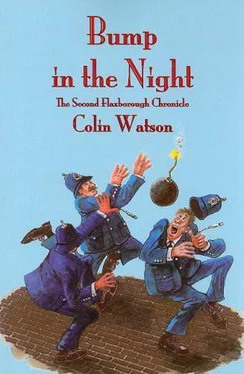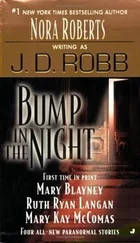“We could,” suggested Councillor Pointer, “ask the police to let us have a report. Confidentially, of course. Would that...er?” He looked from face to face. Alderman Haskell nodded and one or two others looked blank but the Linnet faction rumbled scepticism and its leader returned to the attack.
“No, Mr Chairman, I don’t think it would. I have my reasons for saying that, mind, but I don’t want to go further in regard to them while the Press is here. I’m going to move that we go into closed committee.” Linnet looked across to where Mr Kebble was seated at a small table and made a not unfriendly grimace. Kebble acknowledged it with a wink and a curious two-fingered salutation from behind the shelter of his notebook.
“I second that,” called out Councillor Roger Crispin. “Not,” he added, “that I approve of ‘Iron Curtain’ tactics in this council, but I’m prepared to believe that Councillor Linnet has good grounds for wanting privacy.”
There was a brief silence while the chairman looked questioningly at each in turn of those members who could usually be depended upon to take the opposite line to anything sponsored by Messrs Linnet and Crispin. On this occasion they remained unresponsive.
“All those in favour?” Councillor Pointer asked tonelessly. There was a murmur of assent. He turned towards Mr Kebble and gave him a faint smile of dismissal.
Kebble pocketed his four pencils, picked up his notebook and made for the door. More than one of the watching committeemen felt something of the embarrassment of the after-dinner speaker who arrests the denouement of a dirty story during the slow departure of a waitress.
Then cigarettes and pipes were lighted, someone having noticed that nine o’clock had brought the expiry of the standing order against smoking. Councillor Linnet again addressed the chair.
“Now that we can speak plainly, I’ll come straight to the point in regard to this bombing business. A whole lot of people have told me—they’ve stopped me in the street, rung me up at the shop, called at my home even—they’ve told me that they think the police here in Chalmsbury haven’t made an arrest because somebody—I repeat, somebody—doesn’t want an arrest. A certain name’s been mentioned a good deal, but I don’t propose to repeat it here. I think the chairman will have a fair idea of what I’m...”
“Oh, no, he hasn’t,” growled Pointer, “and I think you’d better explain that insinuation before you say any more.”
Linnet rolled his head from side to side. “Now, Mr Chairman, don’t go off with the idea that I’m getting at you personally. I’m dying to do my duty in regard to the public interest and if it’s got to be said that Chief Inspector Larch is a member of your family, so to speak, then it’s got to be said, that’s all. I was only hoping that you might be in a special position to help us understand what’s going on.”
“There’s no question of anything ‘going on’, as you put it,” Pointer, flushed with anger, glowered at his inquisitor. “My personal relationships are no concern of any member of this council and I think that this attempt to drag them into a distasteful and perfectly pointless argument is monstrous.”
Some ‘hear, hears’ were heard.
Alderman Haskell had begun to make the cud-chewing motions that always showed when he was about to be statesmanlike. “The point with me, Mr Chairman,” he announced, looking round at his colleagues, “is that nobody here wants to cast any reflection on your good self. Let us forget that our police chief happens to be related to you by marriage—a proper and, I trust, happy marriage. The fact remains that a dangerous criminal, perhaps a lunatic, is at large in the town and for nearly a month nothing seems to have been done about it.”
He paused to champ ominously once or twice. “I have myself heard on good authority that the police have received a confession. Yet no one has been taken into custody. There are other rumours in the town, no less disturbing, but I do not think we should form any judgment upon them ourselves.
“What I do suggest—and I should like to propose it formally now—is that we appoint a small deputation to see the Chief Constable of the county and ask him to look into the whole affair in the light of the public disquiet it has aroused.”
There were nods and hrrmphs of assent when Alderman Haskell sat back in his chair and stroked his large nose.
Further contributions were made but they consisted merely of the repetitive sentiments, truisms, irrelevancies and other exercises in the enjoyment of the sound of one’s own voice that passed in Chalmsbury for debate. No one suggested an alternative to Alderman Haskell’s resolution and it was ultimately carried with nicely calculated allowance for a drink in the adjoining Mason’s Arms, where Mr Kebble had been quietly celebrating his expulsion for the past three-quarters of an hour.
Kebble very quickly learned and stored away for reference all that had been deemed too delicate for his ears. Then he drained the last of his brandy and water, guilelessly wished his informants good night, and set off for his office.
As he was walking past the Rialto, Mr Grope emerged to bolt back the doors in readiness for the nightly rush to dodge the national anthem.
“Ah, I was wondering if I might spot you,” said Grope. “It’s come to me.”
Kebble pushed back his hat and looked sympathetic. “Has it, old chap?” Although he had no notion of what Grope was talking about he was conditioned to Chalmsbury conversation, which invariably began at the very point at which a previous exchange, however remote in time, had left off.
“That poem—it was a song; and so you see I wasn’t wrong,” intoned Grope. In mournful monotone he proved his point. “Drink to me o-o-only, wi-ith thine ey-ey-es...”
“...And I’ll not look for wine,” responded Kebble. “Yes, of course. The first two lines of the ‘Mem’ follow straight on, don’t they?”
Grope nodded and went on with his door bolting.
“But the rest of the thing—tassels and all that—I don’t remember that coming into ‘Drink to Me Only’. Why should...”
“Look out,” said Grope. “Here they come.”
Chapter Nine
The Deputation Appointed by the General Purposes Committee to call upon the County Chief Constable consisted of three members. The choice of Alderman Haskell was obvious enough. It was sanctified by his long service, his patriarchal rectitude and his inability to recognize a can when one had been passed to him. He was accompanied, for the sake of appearances and in order to meet any legal snags that might be encountered, by the Town Clerk, Mr L. C. Hooper-Dwyer. The third member—none other than Councillor Pointer—had been selected ostensibly by virtue of his chairmanship of the committee. The real reason was his enemies’ confidence that so heavily compromised a spokesman could not fail to take the opposite line to his personal inclination.
The trio was received by Mr Hessledine, the Chief Constable, with promptitude and affability. The good impression made by this energetic attentive man in his neat grey suit was strengthened by his remembering and using the name of each of his visitors throughout the interview. ‘Elsie’ Hooper-Dwyer expressed the general feeling when he declared in the train on the homeward journey: “I do like a gentleman who never calls you ‘Er’, don’t you?”
Elsie it was who introduced the delicate subject of the meeting.
“You will be aware, sir,” he said, “of the disturbing and inexplicable series of crimes which our community has suffered during the past few weeks.”
The Chief Constable nodded. “I have seen reports of the incidents, Mr Hooper-Dwyer. I agree that they must have been most alarming.” He was watching Elsie’s face, which was intriguingly akin to that of a wax model in an old-fashioned hairdressing saloon: a smooth, translucent, flawless face that bore a silky little moustache. As the Town Clerk’s precisely enunciated words popped forth, his little jaw was thrust forward to display a row of tiny, very white teeth. “How vicious he looks,” thought Mr Hessledine.
Читать дальше












